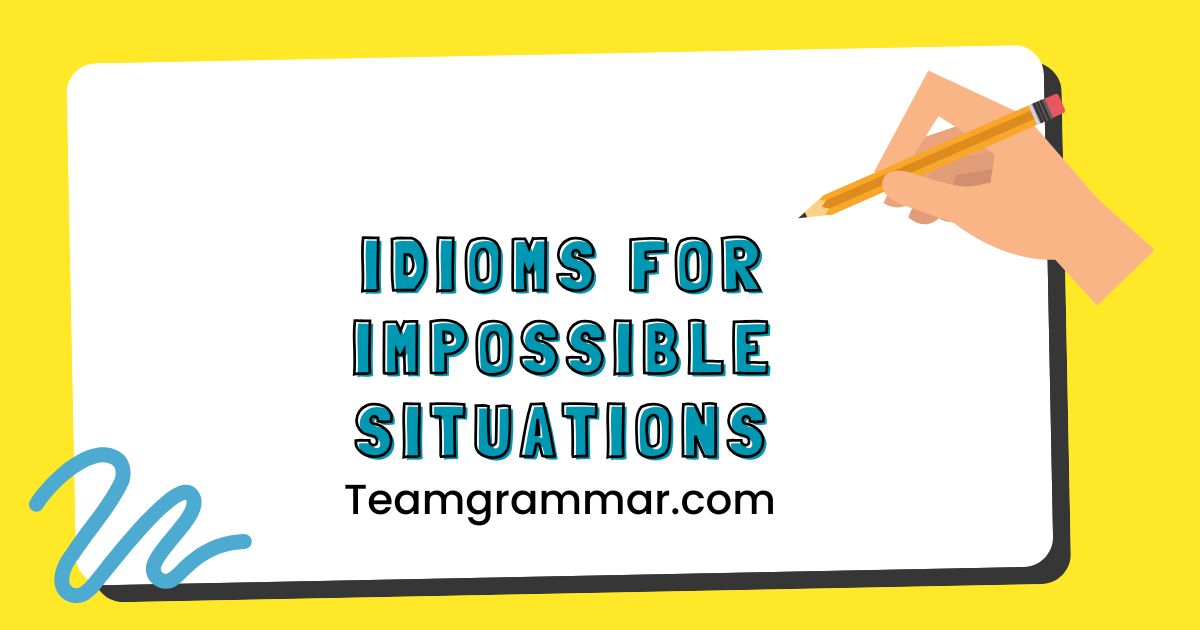31 Idioms for Impossible Situations: A Comprehensive Guide
Navigating the English language often feels like traversing a landscape dotted with colorful idioms. Among these, idioms that describe impossible situations stand out, adding depth and nuance to our communication.
Understanding these expressions is crucial for grasping the full meaning of conversations, literature, and even everyday exchanges. This guide is designed for English language learners, native speakers looking to refine their understanding, and anyone keen on mastering the art of expressive communication.
By exploring the definitions, structures, and usage of these idioms, you’ll gain the confidence to effectively use them and comprehend them in various contexts.
Table of Contents
- Introduction
- Definition of Idioms for Impossible Situations
- Structural Breakdown
- Types and Categories
- Examples of Idioms for Impossible Situations
- Usage Rules
- Common Mistakes
- Practice Exercises
- Advanced Topics
- FAQ
- Conclusion
Definition of Idioms for Impossible Situations
Idioms are phrases or expressions whose meanings cannot be understood from the literal meanings of the individual words. Idioms for impossible situations specifically refer to phrases that describe scenarios that are highly unlikely, unattainable, or completely unrealistic.
These idioms paint a vivid picture of improbability, often using metaphorical language to emphasize the difficulty or impossibility of a task or situation.
These idioms enhance communication by allowing speakers to convey complex ideas concisely and creatively. They add color and personality to language, making it more engaging and memorable.
Understanding these idioms is not only about knowing their definitions but also recognizing the contexts in which they are appropriately used.
Classification
Idioms for impossible situations can be categorized based on the type of imagery they evoke. Some rely on physical impossibilities, while others highlight logical or circumstantial barriers.
For example, some idioms might involve animals performing human tasks, while others might describe situations that defy the laws of physics.
Function
The primary function of these idioms is to express disbelief, skepticism, or frustration regarding a particular situation. They often serve to emphasize the speaker’s perception of the situation as hopeless or unachievable.
Furthermore, these idioms can be used to add humor or sarcasm to a conversation, depending on the context and tone.
Contexts
These idioms are commonly used in everyday conversations, literature, and media. They are particularly prevalent in informal settings where speakers aim to connect with their audience on a more personal level.
However, it’s important to be mindful of the audience and context, as some idioms may be considered informal or even inappropriate in certain formal situations.
Structural Breakdown
The structure of idioms for impossible situations varies widely. Some are simple phrases consisting of a few words, while others are more complex sentences.
However, they all share the characteristic of having a non-literal meaning that is distinct from the sum of their individual parts. Understanding the structural elements can help learners recognize and interpret these idioms more effectively.
Many of these idioms contain verbs in specific tenses to highlight the hypothetical or unreal nature of the situation. For example, conditional sentences are often used to express what would happen if an impossible condition were met.
The use of exaggeration and hyperbole is also common, further emphasizing the improbability of the scenario.
Common Structural Elements
- Verbs: Often in conditional or subjunctive mood to indicate hypothetical situations.
- Nouns: Representing objects or concepts that are inherently impossible or contradictory.
- Adjectives: Emphasizing the extreme or unrealistic nature of the situation.
- Prepositions: Connecting the elements of the idiom in a way that creates a non-literal meaning.
Types and Categories
Idioms for impossible situations can be grouped into several categories based on their underlying themes and imagery. These categories provide a framework for understanding the different ways in which impossibility can be expressed in English.
Physical Impossibilities
These idioms describe situations that defy the laws of physics or the natural world. They often involve animals performing human tasks or objects behaving in ways that are physically impossible.
For example, “When pigs fly” suggests that something will never happen because pigs are incapable of flying.
Logical Impossibilities
These idioms describe situations that are logically contradictory or absurd. They often involve statements that are self-defeating or that violate basic principles of reasoning.
For example, “Trying to nail jelly to a tree” suggests attempting something that is inherently impossible due to the properties of the materials involved.
Circumstantial Impossibilities
These idioms describe situations that are impossible due to specific circumstances or conditions. They often involve tasks that are theoretically possible but rendered impossible by practical constraints or limitations.
For example, “Like getting blood from a stone” suggests trying to obtain something from someone who is unwilling or unable to provide it.
Hypothetical Impossibilities
These idioms often involve conditional statements that propose impossible scenarios. They highlight the unlikelihood of a situation by positing an unreal condition and its consequence.
For example, “If hell freezes over” suggests that something will only happen when something extremely unlikely occurs.
Examples of Idioms for Impossible Situations
The following tables provide a comprehensive list of idioms for impossible situations, categorized by type. Each idiom is accompanied by a definition and an example sentence to illustrate its usage.
Table 1: Physical Impossibilities
This table provides examples of idioms that describe scenarios defying the laws of physics or the natural world, often involving animals or objects behaving impossibly.
| Idiom | Definition | Example Sentence |
|---|---|---|
| When pigs fly | Something that will never happen. | “He’ll clean his room when pigs fly.” |
| A snowball’s chance in hell | No chance at all. | “He doesn’t have a snowball’s chance in hell of winning the election.” |
| Fly to the moon | Achieve the impossible. | “Trying to get him to apologize is like trying to fly to the moon.” |
| Find hen’s teeth | Find something that does not exist. | “You’ll have better luck finding hen’s teeth than finding a parking spot downtown.” |
| Milk a bull | Attempt something futile. | “Trying to get information from him is like trying to milk a bull.” |
| Make water run uphill | Attempt something against the natural order. | “Trying to change his mind is like trying to make water run uphill.” |
| Teach an old dog new tricks | Difficult or impossible to change someone’s habits. | “You can’t teach an old dog new tricks; he’s set in his ways.” |
| Catch a falling star | Achieve something highly improbable. | “Hoping to win the lottery is like trying to catch a falling star.” |
| Hold back the tide | Prevent something inevitable. | “Trying to stop progress is like trying to hold back the tide.” |
| Nail jelly to a wall | Attempt something impossible. | “Trying to organize his thoughts is like trying to nail jelly to a wall.” |
| Get blood from a turnip | Extract something from an unwilling source. | “Trying to get him to volunteer is like trying to get blood from a turnip.” |
| The cows come home | A very long time. | “You can wait until the cows come home, but he still won’t agree.” |
| When hell freezes over | Something that will never happen. | “He’ll apologize when hell freezes over.” |
| Raining cats and dogs | Raining very heavily. | “It’s raining cats and dogs outside; we should stay in.” |
| Turn back time | Reverse something that has already happened. | “I wish I could turn back time and make a different decision.” |
| Walk on water | Achieve something miraculous or impossible. | “He thinks he can walk on water, but he’s just overconfident.” |
| Get a square peg into a round hole | Force something into an incompatible situation. | “Trying to fit her into that role is like trying to get a square peg into a round hole.” |
| See eye to eye with | Agree completely. | “They will never see eye to eye with each other on political issues.” |
| Move mountains | Achieve something seemingly impossible. | “With enough determination, you can move mountains.” |
| Pin the tail on the donkey | A task done by chance or without direction. | “Trying to solve this problem without data is like trying to pin the tail on the donkey.” |
| Count the stars | Attempt something immeasurably difficult. | “Trying to list all the possibilities is like trying to count the stars.” |
| Find a needle in a haystack | Look for something impossible to find. | “Trying to find that document in this mess is like trying to find a needle in a haystack.” |
| Climb Mount Everest in flip-flops | Attempt something extremely difficult without proper preparation. | “Going into that negotiation unprepared is like trying to climb Mount Everest in flip-flops.” |
Table 2: Logical Impossibilities
This table showcases idioms that describe situations contradictory or absurd, violating basic principles of reasoning.
| Idiom | Definition | Example Sentence |
|---|---|---|
| Boil the ocean | Attempt an impossible or overwhelming task. | “Trying to solve all the world’s problems at once is like trying to boil the ocean.” |
| Square the circle | Attempt the impossible, resolve the unresolvable. | “Trying to reconcile these two conflicting opinions is like trying to square the circle.” |
| Unscramble an egg | Reverse something irreversible. | “Trying to undo the damage he’s caused is like trying to unscramble an egg.” |
| Put the genie back in the bottle | Reverse the consequences of an action. | “Once the news is out, you can’t put the genie back in the bottle.” |
| Find a square root of a negative number | Attempt something mathematically impossible. | “Trying to make sense of his argument is like trying to find a square root of a negative number.” |
| Reinvent the wheel | Waste time and effort trying to create something that already exists and is effective. | “There’s no need to reinvent the wheel; just use the existing software.” |
| Catch smoke with a net | Try to grasp something intangible or impossible to hold. | “Trying to understand his reasoning is like trying to catch smoke with a net.” |
| Count sand grains on a beach | Attempt an impossible counting task. | “Listing all the possible outcomes is like trying to count sand grains on a beach.” |
| Turn lead into gold | Achieve something alchemically impossible; make something worthless valuable. | “He’s trying to turn lead into gold with this business venture.” |
| Make a silk purse out of a sow’s ear | Create something valuable from something worthless. | “She’s trying to make a silk purse out of a sow’s ear with that old house.” |
| Find a married bachelor | Find something logically impossible. | “Searching for a married bachelor is a futile exercise in contradiction.” |
| Freeze fire | Do the impossible; achieve something contradictory. | “Asking him to be reasonable is like asking to freeze fire.” |
| Dry the ocean with a towel | Attempt an overwhelmingly impossible task. | “Trying to alleviate poverty with such a small donation is like trying to dry the ocean with a towel.” |
| Ride two horses at once | Attempt to manage two conflicting tasks or relationships simultaneously. | “He’s trying to ride two horses at once by working two full-time jobs.” |
| Swim against the current | Oppose a strong prevailing force or trend. | “Arguing against the popular opinion is like swimming against the current.” |
| Empty the ocean with a spoon | Attempt something futile and overwhelmingly large. | “Trying to fix all the problems with a limited budget is like trying to empty the ocean with a spoon.” |
| Hold water in a sieve | Attempt to retain something that cannot be contained. | “Trying to keep secrets from her is like trying to hold water in a sieve.” |
| Eat your cake and have it too | Enjoy the advantages of something without its disadvantages; have it both ways. | “You can’t eat your cake and have it too; you have to make a decision.” |
| Have your bread buttered on both sides | Have every possible advantage or benefit. | “He always wants to have his bread buttered on both sides, but life doesn’t work that way.” |
| Get a free lunch | Receive something without any effort or cost. | “There’s no such thing as a free lunch; everything comes at a price.” |
| Kill two birds with one stone | Achieve two things with a single action. | “By combining these two tasks, we can kill two birds with one stone.” |
| Have the best of both worlds | Enjoy all the advantages of two different situations. | “Working from home allows me to have the best of both worlds: a career and family time.” |
Table 3: Circumstantial Impossibilities
This table lists idioms describing situations impossible due to specific circumstances or limitations.
| Idiom | Definition | Example Sentence |
|---|---|---|
| Like getting blood from a stone | Trying to obtain something from someone who is unwilling or unable to provide it. | “Trying to get him to admit he was wrong is like getting blood from a stone.” |
| Waiting for Godot | Waiting for something that will never happen. | “They’re just waiting for Godot, hoping for a solution that will never come.” |
| Looking for a black cat in a dark room | Searching for something that is impossible to find. | “Trying to find the error in this code is like looking for a black cat in a dark room.” |
| Settle the Arab-Israeli conflict | Solve a long-standing and deeply complex issue. | “Trying to settle the Arab-Israeli conflict seems like an impossible task.” |
| Outrun your shadow | Escape from one’s past or inherent limitations. | “He’s trying to outrun his shadow, but his reputation precedes him.” |
| Make bricks without straw | Attempt to do something without the necessary materials or resources. | “They’re asking us to make bricks without straw, with no budget or support.” |
| Change a leopard’s spots | Change someone’s fundamental nature or character. | “You can’t change a leopard’s spots; he’ll always be unreliable.” |
| Make a mountain out of a molehill | Exaggerate the importance of something trivial. | “Don’t make a mountain out of a molehill; it’s just a small mistake.” |
| Cry over spilled milk | Waste time being upset about something that has already happened and cannot be changed. | “There’s no use crying over spilled milk; let’s focus on fixing the problem.” |
| Dam the river with a straw | Attempt to block a powerful force with a weak defense. | “Trying to stop the spread of misinformation with just a blog post is like trying to dam the river with a straw.” |
| Find honesty in a politician | Discover something rare or unexpected. | “Finding honesty in a politician is like finding a four-leaf clover.” |
| Make sense of his ramblings | Understand something incoherent or nonsensical. | “Trying to make sense of his ramblings is a waste of time.” |
| Get a straight answer from him | Receive a clear and direct response. | “Trying to get a straight answer from him is like pulling teeth.” |
| Reason with a brick wall | Attempt to communicate with someone unresponsive or stubborn. | “Trying to reason with him is like talking to a brick wall.” |
| Get a rise out of someone | Provoke a reaction from someone who is usually calm. | “It’s hard to get a rise out of him; he’s usually very composed.” |
| Get a word in edgewise | Have an opportunity to speak in a conversation. | “It’s impossible to get a word in edgewise when he’s talking.” |
| Read someone’s mind | Know what someone is thinking without being told. | “I wish I could read her mind to know what she really wants.” |
| See through a brick wall | Perceive something hidden or obscured. | “It’s impossible to see through a brick wall; you need to find another way.” |
| Make an omelet without breaking eggs | Achieve something without causing any negative consequences. | “You can’t make an omelet without breaking eggs; there will always be some sacrifices.” |
| Please everyone | Satisfy all individuals involved. | “You can’t please everyone; someone will always be unhappy.” |
| Be in two places at once | Be present in multiple locations simultaneously. | “I wish I could be in two places at once, but it’s physically impossible.” |
Table 4: Hypothetical Impossibilities
The following idioms involve conditional statements that propose impossible scenarios, highlighting the unlikelihood of a situation.
| Idiom | Definition | Example Sentence |
|---|---|---|
| If hell freezes over | Something that will never happen. | “He’ll agree to my proposal if hell freezes over.” |
| When the stars align | When something extremely unlikely happens. | “They’ll finish the project on time when the stars align.” |
| If pigs had wings | Something that is impossible. | “If pigs had wings, I might believe his story.” |
| Before the second coming | Something that will take a very long time or never happen. | “He’ll pay me back before the second coming.” |
| When the sun rises in the west | Something that is contrary to the natural order. | “He’ll admit he’s wrong when the sun rises in the west.” |
| If wishes were horses, beggars would ride | Wishing alone is not enough to achieve something. | “If wishes were horses, beggars would ride, but we need to take action.” |
| When two Sundays come together | Something that will never happen. | “He’ll clean his car when two Sundays come together.” |
| After the rapture | Something that will take a very long time or never happen. | “I’ll get a promotion after the rapture, I guess.” |
| If the moon turns to cheese | An event that is completely impossible. | “He’ll start exercising if the moon turns to cheese.” |
| When water flows uphill | Something contrary to the natural order of things. | “She will apologize when water flows uphill.” |
Usage Rules
Understanding the usage rules for idioms is crucial for using them correctly and avoiding miscommunication. While idioms add color to language, using them inappropriately can lead to confusion or even offense.
Here are some key rules to keep in mind:
- Context is Key: Always consider the context in which you are using an idiom. Some idioms are appropriate for informal settings but not for formal ones.
- Audience Awareness: Be mindful of your audience. Some idioms may not be familiar to non-native speakers or people from different cultural backgrounds.
- Avoid Overuse: Using too many idioms can make your speech sound unnatural or forced. Use them sparingly and purposefully.
- Correct Interpretation: Ensure you understand the true meaning of the idiom before using it. Misinterpreting an idiom can lead to awkward or humorous situations.
- Grammatical Consistency: Maintain grammatical consistency when using idioms. Avoid altering the structure or wording of the idiom, as this can change its meaning or make it nonsensical.
It’s also important to recognize that idioms can evolve over time, with new expressions emerging and old ones falling out of use. Staying current with popular idioms can help you communicate more effectively and avoid sounding outdated.
Common Mistakes
One of the most common mistakes when using idioms is misinterpreting their meaning. Because idioms have non-literal meanings, it’s easy to assume their meaning based on the individual words, which can lead to incorrect usage.
Another common mistake is using idioms in inappropriate contexts, such as formal presentations or academic writing.
Here are some examples of common mistakes and how to correct them:
| Incorrect | Correct | Explanation |
|---|---|---|
| “He’ll clean his room when cows fly.” | “He’ll clean his room when pigs fly.” | The correct idiom is “when pigs fly,” not “when cows fly.” |
| “She has a snowball’s chance in heaven.” | “She has a snowball’s chance in hell.” | The correct idiom is “a snowball’s chance in hell,” not “heaven.” |
| “I’m trying to nail pudding to a wall.” | “I’m trying to nail jelly to a wall.” | The correct idiom is “nail jelly to a wall,” not “pudding.” |
| “Let’s not spill milk over crying.” | “Let’s not cry over spilled milk.” | The correct idiom is “cry over spilled milk,” not “spill milk over crying.” |
By being aware of these common mistakes, learners can avoid making them and improve their fluency in English.
Practice Exercises
Test your understanding of idioms for impossible situations with the following exercises. Choose the correct idiom to complete each sentence.
Exercise 1: Multiple Choice
| Question | Options | Answer |
|---|---|---|
| He’ll agree to my proposal __________. | a) when the cows come home, b) if hell freezes over, c) when pigs swim | b) if hell freezes over |
| Trying to get him to admit he was wrong is like __________. | a) getting water from a tap, b) getting blood from a stone, c) getting milk from a cow | b) getting blood from a stone |
| They’re just __________, hoping for a solution that will never come. | a) waiting for Santa, b) waiting for Godot, c) waiting for the bus | b) waiting for Godot |
| Trying to solve all the world’s problems at once is like __________. | a) stirring the soup, b) boiling the ocean, c) cleaning the house | b) boiling the ocean |
| Once the news is out, you can’t __________. | a) open the window, b) close the door, c) put the genie back in the bottle | c) put the genie back in the bottle |
| Trying to find that document in this mess is like trying to __________. | a) find a penny on the street, b) find a needle in a haystack, c) find a key in a drawer | b) find a needle in a haystack |
| You can wait ________, but he still won’t agree. | a) a few minutes, b) a long time, c) until the cows come home | c) until the cows come home |
| He’s trying to ________ by working two full-time jobs. | a) work really hard, b) ride two horses at once, c) make a lot of money | b) ride two horses at once |
| Arguing against the popular opinion is like __________. | a) going with the flow, b) swimming against the current, c) taking a break | b) swimming against the current |
| You can’t _________; someone will always be unhappy. | a) please everyone, b) make a cake, c) win the game | a) please everyone |
Exercise 2: Fill in the Blanks
| Question | Answer |
|---|---|
| He’ll start exercising if the __________. | moon turns to cheese |
| If wishes were __________, beggars would ride. | horses |
| Trying to reason with him is like talking to a __________. | brick wall |
| They’re asking us to _________ without straw, with no budget or support. | make bricks |
| Trying to get a straight answer from him is like __________. | pulling teeth |
| It’s impossible to _________ when he’s talking. | get a word in edgewise |
| She will apologize when __________. | water flows uphill |
| He thinks he can ________, but he’s just overconfident. | walk on water |
| Trying to fit her into that role is like trying to get a ________ into a round hole. | square peg |
| With enough determination, you can __________. | move mountains |
Advanced Topics
For advanced learners, exploring the origins and cultural significance of idioms can provide a deeper understanding of their meaning and usage. Many idioms have historical roots that reflect the social, economic, and political conditions of the time.
Understanding these origins can add another layer of appreciation to the language.
Another advanced topic is the use of idioms in figurative language and rhetoric. Idioms can be powerful tools for persuasion and argumentation, allowing speakers to convey complex ideas in a memorable and engaging way.
Analyzing how idioms are used in speeches, literature, and advertising can provide valuable insights into the art of effective communication.
Additionally, exploring the variations and adaptations of idioms across different dialects and regions can enhance your understanding of the diversity of the English language. Some idioms may have slightly different meanings or forms depending on the geographic location, and being aware of these variations can help you avoid misunderstandings.
FAQ
- What is an idiom?
An idiom is a phrase or expression whose meaning cannot be understood from the literal meanings of its individual words. It’s a figure of speech that has a culturally understood meaning different from what its constituent words suggest.
- Why are idioms important to learn?
Idioms are essential for understanding native English speakers and for making your own speech more natural and expressive. They add color and personality to the language and are frequently used in everyday conversations, literature, and media.
- How can I learn idioms effectively?
The best way to learn idioms is through exposure and practice. Read widely, listen to native speakers, and make a conscious effort to use idioms in your own speech and writing. Flashcards, online resources, and language exchange partners can also be helpful.
- Are idioms the same in all English-speaking countries?
No, idioms can vary significantly between different English-speaking countries and regions. Some idioms may be unique to a particular dialect or culture, while others may have different meanings in different places. Be mindful of regional variations when using idioms.
- Can I create my own idioms?
While it’s technically possible to create new idioms, it’s unlikely that they will be widely adopted unless they catch on organically and become part of the common vernacular. It’s generally best to stick to established idioms that are already recognized and understood.
- How do I know when it’s appropriate to use an idiom?
Consider the context, audience, and tone of your communication. Idioms are generally more appropriate in informal settings than in formal ones. Be mindful of your audience and avoid using idioms that may be unfamiliar or offensive. Use idioms sparingly and purposefully to enhance your message.
- What should I do if I don’t understand an idiom?
Don’t be afraid to ask for clarification. If you hear an idiom that you don’t understand, ask the speaker to explain its meaning. You can also look up the idiom online or in a dictionary.
- Are there any idioms that should be avoided?
Yes, some idioms may be considered offensive, insensitive, or outdated. Avoid using idioms that perpetuate stereotypes or that are based on discriminatory language. Be mindful of cultural sensitivities and choose your words carefully.
- How do I avoid misusing idioms?
Double-check the meaning of the idiom before using it, and make sure it fits the context of your sentence. Pay attention to grammar and word order, and avoid altering the idiom’s structure. If you’re unsure about using an idiom, it’s best to err on the side of caution and choose a more literal expression.
- Can idioms be translated directly into other languages?
No, idioms cannot typically be translated directly into other languages because their meanings are not literal. A direct translation would likely result in a nonsensical or incorrect interpretation. Instead, you need to find an equivalent idiom or expression in the target language that conveys the same meaning.
Conclusion
Mastering idioms for impossible situations is a valuable skill that can significantly enhance your understanding and use of the English language. These colorful expressions add depth, nuance, and personality to communication, allowing you to convey complex ideas concisely and creatively.
By understanding the definitions, structures, and usage rules of these idioms, you can effectively use them in various contexts and avoid common mistakes.
Remember to consider the context, audience, and tone of your communication when using idioms. Practice regularly, expose yourself to a wide range of English materials, and don’t be afraid to ask questions when you encounter unfamiliar expressions.
With dedication and persistence, you can master the art of using idioms for impossible situations and become a more fluent and confident English speaker.







